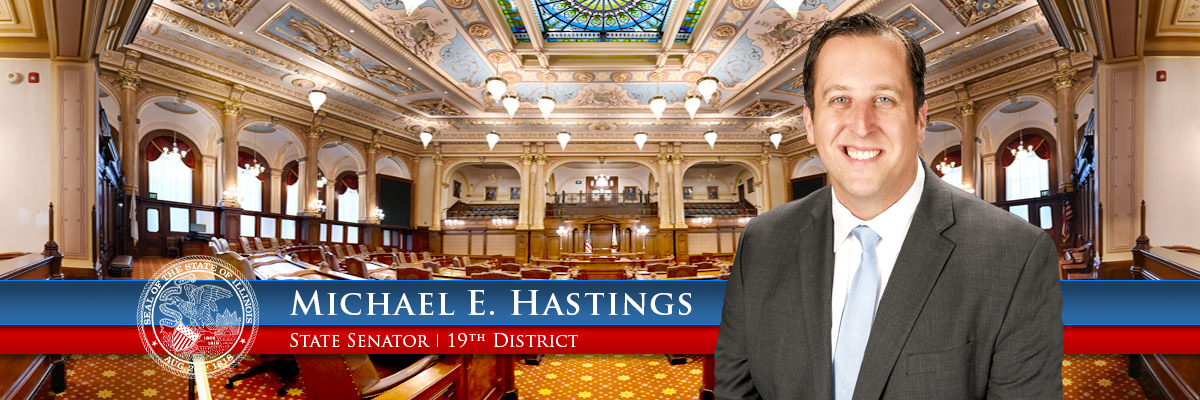Hastings works to streamline FOID application process
- Details
- Category: Press Releases
SPRINGFIELD – State Senator Michael E. Hastings (D-Frankfort) joined State Senator Dave Koehler (D-Peoria), State Representative Jay Hoffman (D-Belleville) and Illinois State Police Director Brendan Kelly Wednesday for a press conference to discuss legislation aimed at modernizing the Firearms Owner Identification card procurement process.
“The modernization of government services is an ongoing, but necessary process,” Hastings said. “We are undertaking this initiative because of the belief that responsible gun owners should not be penalized due to those who have taken advantage of the existing system,” Hastings said. “By bringing this system into the 21st Century, we can remove burdens from law-abiding gun owners and give law enforcement the ability to hold bad actors accountable.”
Senate Bill 1165, an initiative of the ISP, would make significant changes to make the FOID process more efficient, including:
- Creating a prohibited persons portal to help law enforcement identify people whose FOID cards have been revoked,
- Allowing for the automatic renewal of FOID cards for people who have valid concealed carry licenses or have voluntarily submitted fingerprints in situations where the ISP does not find the licensee ineligible.
- Permitting the use of electronic FOID cards and concealed carry licenses that can be displayed on a mobile phone or electronic device,
- Establishing a review board to respond to revocations and denials quickly.
“Our goal is to ensure that we are keeping firearms out of the hands of people who are a danger to themselvesand others,” said Koehler, who is the legislation’s lead sponsor. “Our goal is not, however, to hassle safe, responsible gun owners. Through the modernization and streamlining of the FOID card process, I believe we can successfully accomplish both of our objectives.”
This legislation has been assigned to the Senate Executive Committee and could be heard in the following weeks.
Hastings, Martinez join to promote transparency in Cook County government
- Details
- Category: Press Releases
CHICAGO – State Senator Michael E. Hastings (D-Frankfort) joined Cook County Circuit Court Clerk Iris Y. Martinez for a press conference Wednesday to discuss shared legislative efforts to restore public trust and increase transparency in Cook County government.
“A government’s job, first and foremost, is to serve in the best interest of the public,” Hastings said. “That means it is our responsibility to make more public records available so those in office are held to the highest possible ethical standard. I am humbled to have the opportunity to collaborate with Clerk Martinez on this legislation and to further the dialogue in Springfield on increased government accountability and transparency.”
“We strongly believe the public has the right to know how public dollars are being spent, and more importantly, that they have access to that information,” Martinez said. “Including the Circuit Court Clerk’s Office under the Local Records Act makes sure that information remains public even after my tenure as the Clerk of the Circuit Court of Cook Country.”
Senate Bill 583 would include the Clerk of the Circuit Court of Cook County under the Local Records Act, providing greater transparency to the public regarding how the clerk’s office uses its public funds. The Circuit Court Clerk’s Office is a non-judicial office of the judiciary, and not a local government or public body currently subject to FOIA.
Additionally, the legislation requires all clerks of circuit courts to accept credit card payments over the internet for fines, penalties, court costs, and other costs, providing convenience for a county’s citizens when paying fines and fees.
This legislation will be considered before the Senate in the coming weeks.
Hastings pushes to provide sick time flexibility for airline employees
- Details
- Category: Press Releases
CHICAGO – State Senator Michael E. Hastings (D-Frankfort) joined with several airline employees for a press conference Thursday to advocate for legislation that would give those employees the chance to use earned sick time to care for sick family members.
“Today marks the next step in our fight to make sure those hard-working folks who go above and beyond to make travel seamless are able to use their earned sick time to help loved ones in need,” Hastings said. “This is, quite simply, the right thing to do for working families in Illinois.”
Hastings was inspired to lead the measure by two residents of the district he represents, both of whom are flight attendants for Southwest Airlines. Corliss King’s husband was diagnosed with end-stage renal disease in 2017 and was hospitalized several times, receiving various surgeries that left him in need of care at home. Corliss was able to use her own accrued sick time to help care for her husband and children until 2017 when a law was passed that removed coverage for airline employees.
“In the event of a personal family emergency, airline workers are currently forced to choose between caring for a sick family member and earning their paycheck. To me, there should not be professional consequences for having a family that needs us just because you chose the airline industry as a career. We aren't looking for special treatment, just equal treatment for all Illinois workers. It is the right thing to do."
Susan Lyons has a similar story. When her brother, a single father, suffered a heart attack, was pronounced dead, and revived but in a stable coma, Susan was forced to take unpaid Family Medical Leave Act leave, rather than use any of the 300+ sick hours she had accrued on the job. She lost over a month of income during the time she was caring for her brother and his child.
“Our loved ones deserve to know that we can be there for them in their time of need without risking our careers,” Lyons said. “We are not asking for much.”
Senate Bill 645 passed the Senate Labor Committee on March 18 and will be considered before the Senate in the coming weeks.
Hastings leads on expanding access to utility bill relief programs
- Details
- Category: Press Releases

FRANKFORT – A measure led by State Senator Michael E. Hastings (D-Frankfort) that would expand access to utility bill assistance programs passed the Senate Energy and Public Utilities Committee Thursday.
“The COVID-19 pandemic forced many working families into untenable situations with skyrocketing energy bills they cannot afford,” Hastings said. “As a public servant, I take the responsibility to safeguard the livelihood of our most vulnerable residents very seriously, and I believe the legislature has the chance to do so by acting on this proposal.”
Under Senate Bill 265, families above 60% of the Illinois median income level would be ineligible for the Low Income Home Energy Assistance Program (LIHEAP) and Percentage of Income Payment Plan (PIPP). Additionally, the legislation establishes a priority application period for households with children under age 6 and extends LIHEAP and PIPP availability to all eligible low-income residents.
The Low-Income Energy Assistance Program and Percentage of Income Payment Plan offer bill payment assistance to low-income residential utility customers by helping eligible households pay for their gas and electric utility service. Both programs are administered by the Illinois Department of Commerce and Community Affairs (DCEO).
“Unfortunately, too many working families are slipping through administrative cracks or are unaware of the assistance available to them,” Hastings said. “By expanding and promoting these programs, we can give those struggling the chance to emerge from this pandemic stronger.”
This legislation now awaits consideration before the Senate.
More Articles …
Page 43 of 59



